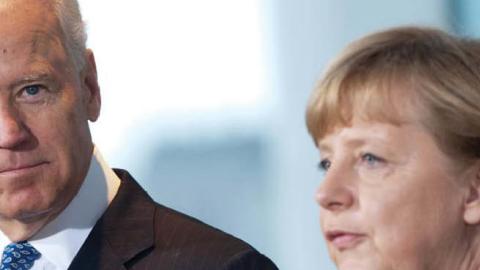Outgoing President of the European Commission and German Chancellor Angela Merkel delivered a lesson in realpolitik to President-elect Joe Biden just before the new year. In pushing through a new EU trade deal with China, defying the clear request of the Biden team to delay it pending “prior consultations,” the European leadership asserted its independence from the United States in relations with China. Together with Chancellor Merkel’s pre-Christmas announcement that Huawei will not be banned from Germany’s telecommunications network, the European Commission’s similarly timed announcement of a plan to regulate digital network platforms more rigorously, a plan which largely applies to U.S. technology giants, and France’s end of the year decision to impose a digital tax on U.S. technology companies, this deeply undermines the Biden plan to enlist Europe in meeting the China challenge. In a larger context these actions show that rejuvenating the economic alliance with Europe, a key to rebuilding both multilateralism and the domestic industrial base, faces major obstacles in implementation.
The Chancellor’s decisions, if confirmed by the Bundestag, build on its choices to favor economic cooperation with China, its largest trading partner, over the security and technology leadership priorities articulated first by the Trump administration. These policies went largely unchallenged, in substance if not form, by the Biden campaign. China has made deep inroads into the economies of other European countries as well, especially in Southern and Eastern Europe. Italy, Serbia, Slovenia, Greece and Hungary are all working with China through its Belt and Road Initiative (BRI). BRI is largely devoted to infrastructure and raw materials projects, but it also opens European markets to Chinese exports. Any future U.S. initiatives to curb Chinese mercantilism, either through the World Trade Organization (WTO) or by concerted allied pressure, will face the conflict of growing European dependence on China for both exports like automobiles and luxury goods and for infrastructure investments.
As China builds its own technology industries, partly through subsidization of its own firms and appropriation of Western technology, it grows as a competitor to traditional European industries. China is already a leader in the electric vehicle industry and owns a significant stake in German giant Daimler. China dominates electric battery materials and production as well. Its purchase of German machine tool pioneer Kuka is just one example of the growing interdependence of machinery industries. China’s 2025 goals for self-sufficiency threaten other European sectors like semiconductors, commercial aviation, biotechnology, bank payments systems, and online retail sales. Nonetheless, Europe’s desire to be a regulatory superpower is directed to U.S. industries more than Chinese.
A major trend in European thinking about the Chinese challenge is an ambition to build “national champions,” targeting sectors like cloud computing, biotechnology, semiconductors and green technologies. Europe of course has deep experience in subsidizing industries like commercial aviation and agriculture, but its industrial policy plans contradict repeated protestations to be the global pillar of multilateral, rules-based free trade. The Biden team is also attracted to more robust industrial policies and, like Europe, wants to use government procurement power to support domestic industries. The two traditional partners thus risk creating a competitive cycle of increasing industrial subsidies and privileging domestic production over fully open trade regimes. Such a combination would undermine any attempt to reform the WTO to better discipline Chinese and other countries’ industrial policies and mercantilist practices.
The Biden program also includes an aggressive commitment to address climate change, which encompasses support for a green industrial sector. To succeed it will require regulatory support and financial incentives to displace a carbon-based economy. Europe is already committed to this path and some of its companies are leaders in wind and solar technologies. The United States has only one of the top ten global firms in each these industries. It remains to be seen if the Biden team will double down on its “Build Back Better” program to subsidize companies in the green sector, which would likely antagonize the Europeans because they do have a major presence already in green wind and solar. Europe, for its part, is considering actions like a border carbon tax to block imports of products like U.S.-origin liquified natural gas because of high methane emissions from production, while at the same time moving ahead to import more Russian natural gas. China emits more than three times the methane of the United States and Russia about ten percent more despite its much smaller economy.
Biden and his climate czar, John Kerry, are committed to building coalitions to bolster the global Paris climate accord. The biggest outlier in carbon emissions of course is China, whose CO2 footprint is already almost twice that of the United States. China has verbally committed only to “peak emissions” by around 2030. If the Middle Kingdom is to achieve its own goals of doubling or tripling per capita GDP by 2035, it is likely to increase its CO2 emissions by 50 to 100 percent by this time, even assuming ambitious progress in increasing the efficiency of its industry in terms of fossil fuel inputs. The question for the Biden team is: will Europe cooperate in challenging major climate outliers like China and Russia if it continues to build trade and economic cooperation with them?
President-elect Biden’s emphasis on the need for more concerted global action to address major economic and climate change issues is well founded. China has become a major global economic power and the United States alone cannot convince it to change its economic model, as the Trump administration found. Europe is a key to any alliance strong enough to take on China, reform the WTO and build more support to address climate change. The old continent’s propensity for regulating global technology companies and building its domestic economy through industrial policy, along with its growing reliance on cooperation with China and Russia for energy and export markets, make any progress on the Biden alliance program a difficult task.
Read in Forbes















